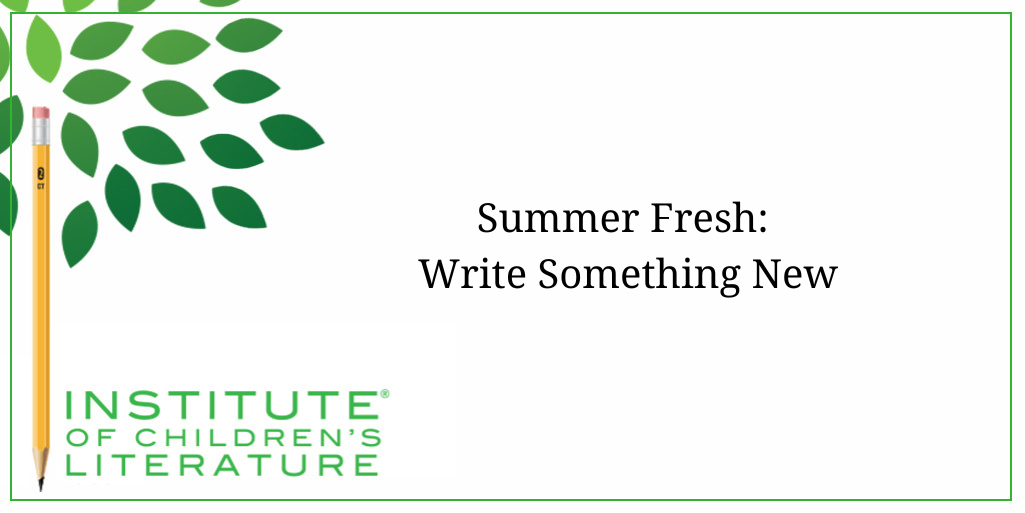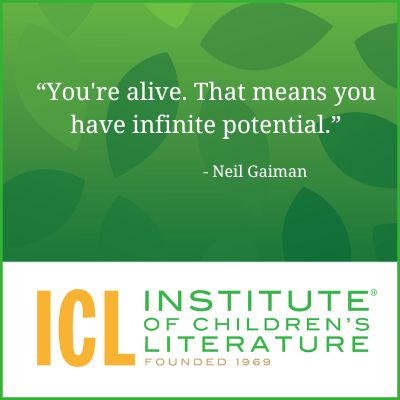
5 Ways Writers Can Prep for 2025 Goal Setting
Before we roll on to the new writing year, let’s harness our optimism for the blank slate before us and prepare for our 2025 Goal Setting just for writers.

We teach our students how to write and get published!
View our Course Catalog >
If you’re like me, one of the best things about summer is the availability of fresh fruits and veggies. I don’t mind fresh flowers now and then either. But summer can offer a chance for writers to try something new and fresh too, something to keep you interested and active in your writing. Let’s look at some summer fresh possibilities to write something new.
Children’s writers often don’t think a lot about genre, especially in the early days of a writing journey, but genre can affect every level of children’s writing. I’ve seen magazine short stories that were fantasies, horror, mysteries, action/adventure, and even westerns (including tall tale stories set in the old west).

Exploring genre in unique ways such as in children’s short stories or picture books requires, we think deeply about what defines a genre and how to use those elements to create something that would appeal to a child. Obviously, some genres have to be tweaked quite a bit. Horror at the picture book level is usually only slightly creepy, not truly scary. And sometimes horror for picture book level is more humor than spook. But part of the freshness of writing in a new genre within an unusual format is how much we exercise our brains to make it work. Even if you don’t go the whole way into writing an early reader science fiction short story or a picture book romance, just thinking about them, plotting, planning, and figuring out how something like that could work will give your hot summer brain a boost.
Most of us do the bulk of our writing for only one age group, so summer might be a great time to dabble in a fresh new age group. This can be done as a serious effort (trying your hand at an early chapter book when you’ve only written for teens or writing a poem for elementary kids when you’ve been primarily a picture book writer) with the hope of publishing what you write, or it might be only an exercise to challenge your creative brain and see what you can do.
For example, imagine a scene from something you’ve written. How would it change if the characters were much younger or much older? Writing the scene with characters and attitudes of a different age group can give you a fresh perspective. It can even show you things you might do to improve the original work. The bulk of the children’s writing I do is for third and fourth grade readers, and that’s where I am most comfortable. But I have also written for babies and toddlers (pieces that were published in Highlights Hello), and for teens (stories and poetry that were used for testing materials). Though stretching my writing muscles to create something for such disparate ages wasn’t easy, it did help me understand more about how age groups need to be addressed and simply made me a better writer.
You don’t need to stop your stretching at children’s writing either. Many children’s writers are writing because they were inspired by having experienced interesting things in their own lives. What if you explored some of those things from your adult perspective? This is one area where Chicken Soup for the Soul has been a huge opportunity for our readers because the anthologies cover such a huge expanse of experiences. They can be a great place to tell your own real-life story or a story from your real family. Whatever you decide to try, stretching to write something new for an age group that is new makes you more aware of what you’re doing, even after you return to the kind of writing where you feel most comfortable.
Another way to bring some summer freshness into your writing is to try a fresh new format. If you’ve only been a prose writer, give yourself permission to write a little poetry (even if it’s not amazing, children’s poetry and the unique way it turns a single image or moment into something profound is a wonderful way to grow as a writer). If you’ve thought of yourself as solely a picture book writer, consider stretching a little further to write a short story or even a chapter book.
Format isn’t the only way to break out of your rut. You need to look at other things you tend to do in the same way over and over. For example, if you usually write girl protagonists, try a story, poem, or picture book with a boy main character. If you usually write third person, try first or even second. (One of the most well-known picture book series was written in second person when one writer explored what happens when you give a mouse a cookie.) Trying anything that forces you to approach your writing in a new way will make you a stronger, fresher, more creative writer.
Right now, nearly everything about the children’s publishing industry is in a state of change and it can be really difficult to keep up. Editors are being hired while others are leaving. Publishers are being bought by other publishers and some are closing their doors. New interests and trends are developing while others are waning. New agents are learning the trade and hanging out their shingles.
All of these changes mean writers need to pay attention in order to stay on top of what we need to do to adapt to changing conditions. That means research is something we all need to keep a fresh eye on. There are opportunities all around us, and it’s easy to miss them if we don’t keep an eye open. Market guides are great, and you certainly need one, but the reality is that your market guide will need your help as you study markets and jot notes about changes. By the time your market guide is a year old, it needs to be filled with highlighting and written notes if you’re going to avoid missing a possible perfect match for you and your work. So, keep that fresh through the summer months as well.
Having a fresh summer will keep you growing, improving, and creating while helping you stay on top of trends and changes in the industry. By the end of summer, you might just find you’re so fresh, you’re blooming.
Summer offers you a chance to write something new, something to keep you active in your writing. Let’s look at some summer fresh possibilities for writers.
With over 100 books in publication, Jan Fields writes both chapter books for children and mystery novels for adults. She’s also known for a variety of experiences teaching writing, from one session SCBWI events to lengthier Highlights Foundation workshops to these blog posts for the Institute of Children’s Literature. As a former ICL instructor, Jan enjoys equipping writers for success in whatever way she can.

Before we roll on to the new writing year, let’s harness our optimism for the blank slate before us and prepare for our 2025 Goal Setting just for writers.

Writers can be thin-skinned when it comes to getting feedback on their work. Let’s look at 4 ways to positively deal with constructive criticism!

Rejection is part of the territory when it comes to being a writer. Today we offer reflection for writers to help redirect your efforts after a rejection.
1000 N. West Street #1200, Wilmington, DE 19801
© 2024 Direct Learning Systems, Inc. All rights reserved.
1000 N. West Street #1200, Wilmington, DE 19801
© 2024 Direct Learning Systems, Inc. All rights reserved.
1000 N. West Street #1200, Wilmington, DE 19801
© 2024 Direct Learning Systems, Inc. All rights reserved.
1000 N. West Street #1200, Wilmington, DE 19801
© 2025 Direct Learning Systems, Inc. All rights reserved.
1000 N. West Street #1200, Wilmington, DE 19801
©2025 Direct Learning Systems, Inc. All rights reserved. Privacy Policy.
2 Comments
I recently went from the 4-7 audience to the YA when I got a payed assignment to write short video scripts. I found out I liked YA better! So now I’m going to write for both audiences.
Congratulations. It’s exciting when we make those kinds of discoveries.